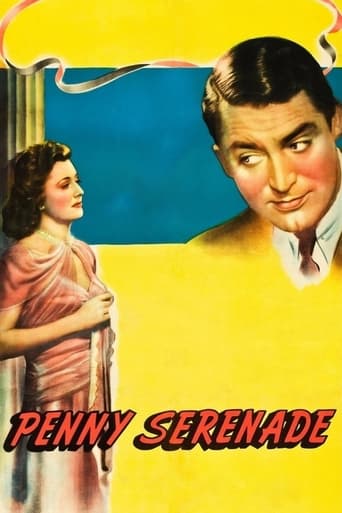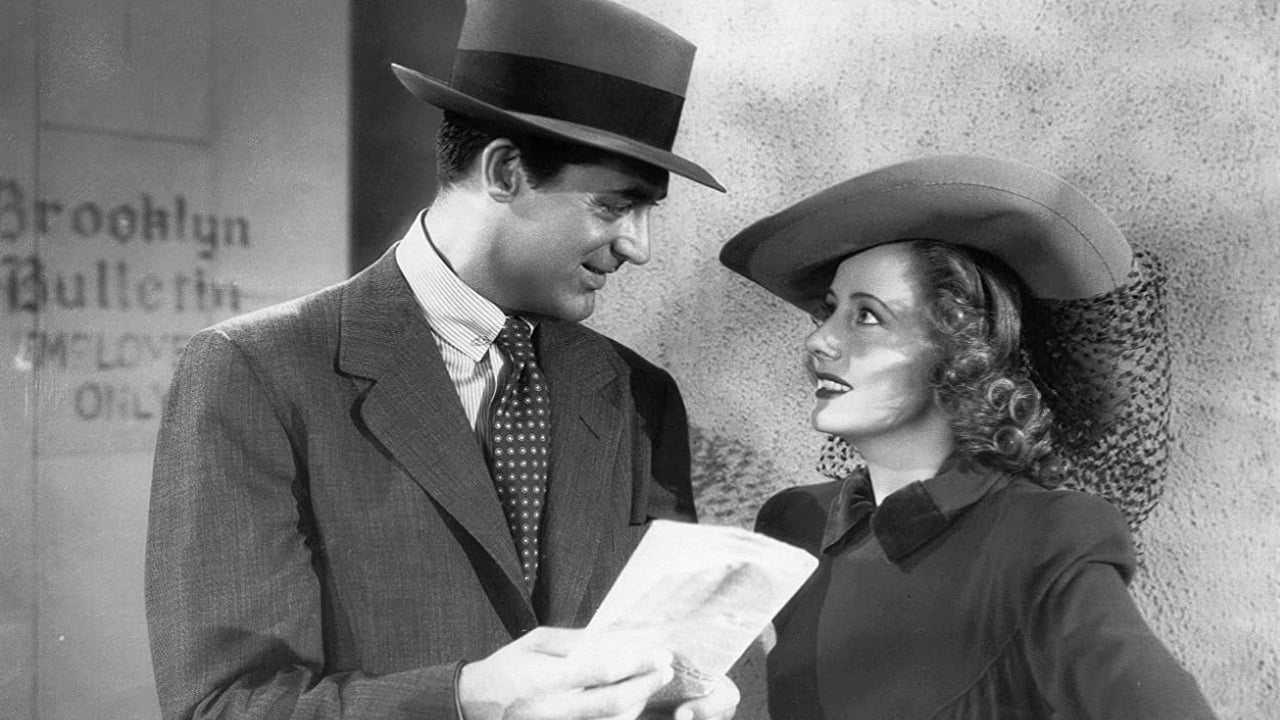SimonJack
Most people in the 21st century who watch Cary Grant movies no doubt think of him as a comedy actor. And, they would be right - he is one of the best actors in sound comedy films through the 1950s. And one of the best all time movie entertainers for that reason. But, before Grant was making the movies that most people remember him for, he also was making some serious films. And this is one of them. "Penny Serenade" of 1941 earned Grant his first of two Oscar nominations. This is a film about romance, sacrifice, family and love. And yet, Grant's Roger Adams infuses humor into the role. It's not the witty dialog or wisecracking that he's so good at, along with comedy antics. Rather here, it's a warm humor of stumbling on furniture, dropping things in the dark, and bumping into doors as he and wife, Julie, care for their newly adopted baby. The film has tragedy as well, and runs the gamut of emotions as Roger and Julie cope and try to make a living. Irene Dunne has top billing for this film, and her superb performance compliments and reinforces Grant's role. Grant makes an impassioned plea to a judge for the couple to be able to keep their adopted daughter. I can't think of a more emotional a scene in any dramatic film. It shows the range of Grant's abilities as an actor. This is a great movie about children, love and family. It matches two of the best stars of the time in a serious film after their successful comedy pairings of 1937 ("The Awful Truth") and 1940 ("My Favorite Wife"). Two very good supporting performers give great roles as well. Beulah Bondi is Miss Oliver who helps the couple adopt a baby. And, Edgar Buchanan is Roger's pressman who also is bitten by the bug of a child around the place. This is good entertainment for the whole family. Parents might use it to educate their children about adoption.Here are some favorite lines from this film. For more dialog see the Quotes section under this IMDb Web page of the movie. Roger Adams, "But we don't know anything about such little babies." Miss Oliver, chuckling, "Well, no one does until they have them."Roger Adams, "She's yours, dear. Ours, now and forever. Nothing can ever take her from us now."Julie Adams, "Dinner in my own home, and I didn't have to cook it."Trina, "Gee, I don't know what people'd do without Christmas." Julie Adams, "I don't know what we'd do without you, honey."
moonspinner55
Cary Grant and Irene Dunne as a married couple with regrets who tearfully plan to part; the wife's recollections of their union (via her phonograph records!) tell the story: they were childless after lucking into the adoption of a six-week-old baby girl, whose health suddenly grows worse in her formative years. Producer-director George Stevens smoothly steers this star-vehicle from light comedy to tragedy without hitting so much as a bump. The comfortable leads obviously do a lot to make the scenario an involving one, though Morrie Ryskind's script, from an original story by Martha Cheavens, is little more than a novelette. Grant received an Oscar nomination for his work; while Dunne works the audience over with sentiment--with faraway eyes and a faraway voice--Grant's honest, forthright husband connects with the audience in a more direct way. His reluctance to take on an infant--a girl even!--has to be nimbly handled so that this character doesn't come off cold or stubborn. Dunne has a standout bit trying to change the baby's diaper with a crowd watching (it's a funny/emotional scene many new mothers may recognize), but Grant's portrait of the 'ordinary man' with money worries and job troubles becomes the focal point of the picture. With Beulah Bondi as the adoption agent (she's directed to glow with grandmotherly warmth and yet look upon this couple with skepticism, often in the same scene) and Edgar Buchanan, who uses his humorous brand of cracker-barrel wisdom to get through a baby-bath. **1/2 from ****
disinterested_spectator
Julie's marriage to Roger is on the rocks and they are about to separate. When she is by herself, she plays a succession of records associated with different stages of her relationship with Roger. With the playing of each record, the tune becomes the background music of a flashback, beginning with when they first met, and at important stages in their lives. But the flashbacks show us what a great marriage they have, so we figure something really bad must have happened to cause these two to separate. After an accident, Julie is no longer able to have children, so they adopt a girl. At first I thought that somehow Roger was going to be responsible for her death, by accidentally running over her when she runs out into the street. She does die, but it is clearly not anyone's fault, not even accidentally so. Furthermore, her death is not even seen, but only mentioned in a letter, followed by scenes of the two of them being silent and sad. We never really believe that they are going to get divorced, and they don't.The plot of this movie is similar to "The Marrying Kind" (1952), where another couple is about to get a divorce. Instead of records playing tunes from the past, the divorce judge, who can see that they have a good marriage, questions them, and their story is told in flashbacks, revealing what a good marriage they have, making us wonder when we are going to get to the part that made them so miserable. Once again, we find that a child died, this time by drowning; once again it is an accident for which neither of them can be thought to be responsible; and once again we can see that this is something that they will eventually get over, and so they do not get the divorce.The moral of these stories seems to be that people who are in an unhappy marriage should stay together and work things out. There is something irritating about the way both movies are dismissive of just how miserable a marriage can be, as if married couples who want a divorce simply don't realize how much they really love each other.
NOXiFy
This whole movie is full of disappointments and sorrow, it follows the trouble of Julie and Roger Adams who are constantly screwed in life's journey. The movie is black and white but has a very clear picture and pretty good sound quality for a 1941 film. The movie is shot mostly indoor so the lighting is adequate. The only complaint that I have for the movie is that it's two hours long. It's a little drawn out and doesn't really need the whole two hours that it fills up. Some scenes could definitely be pulled out so that the film is easier to sit through in one sitting. Overall I rated the film an 8 out of 10 because it's a very sad and developed story, the only complaint that I have is the length of the film.



 AD
AD





